The eyes are the window of the soul and often into the visible signs of aging. The delicate skin around the eyes more easily creases and wrinkles. What you eat and drink as well as how you treat the skin around your eyes contribute to your overall eye health. While you can’t prevent all signs of aging, you can take care of your eyes and the skin around them with your lifestyle habits and skincare routine.
How to take care of your eyes from the inside out
Stay hydrated

Is there any aspect of health that doesn’t benefit from adequate hydration? Your eyes fall in line with the rest of your body’s need for water.
Your hydration levels affect your tears. Tears do more than show your emotions. Throughout the day, you create tears that wash away debris, keep the eyes lubricated, and prevent infection. Dehydration can cause blurry vision because the water needed to keep the eyes hydrated also helps focus the light that enters the eyes.
If you’re not sure how much water you need, a good place to start is to drink eight, eight-ounce glasses of water every day. Try to spread that water out throughout the day to prevent too many visits to the bathroom.
However, you may need more or less water than that based on your body weight, activity level, and the outdoor temperature. For example, if you run outside in hot weather, you need to drink extra water to replace the water that escapes through perspiration.
Additionally, a larger, taller body requires more water than a shorter, smaller one. You want to drink enough water that your urine looks light yellow. If it appears dark yellow or brown, you need to increase your water intake.
Eye-supportive nutrition
A well-balanced diet makes sure that your eyes get the nutrients (the body’s building blocks) your body needs. Citrus fruits high in vitamin C, and foods rich in omega-3 fatty acids, vitamins A and E, and zinc help support good eye health. Include a wide range of foods, such as green leafy vegetables, red bell peppers, salmon, and tuna.
Eye protection

UV protective sunglasses protect your eyes and the skin around them from harmful UV rays. UV rays can penetrate the skin and damage the collagen and elastin that gives the skin its flexibility. Those same rays can also harm your eyes, causing redness, dryness, and itchiness. Wearing sunglasses also prevents squinting, which can contribute to the visible signs of aging.
Skin care around the eyes
The skin around the eyes is thinner than other places on the face or body. Be extra gentle when washing your eyes. Use a gentle cleanser like SkinResourceMD’s Total Facial Cleansing Gel. This formula is gentle enough for the skin around the eyes but strong enough to remove makeup. It also protects the skin’s natural moisture, so it doesn’t leave the eyes feeling tight or stretched.
Gently moisturize the skin around the eyes. You can use a specialized product like Eye Perfection Therapy that treats fine lines, dark circles, and swelling while at the same time providing vitamins and antioxidants that smooth and moisturize the skin.
However, you can also use a general-purpose facial moisturizer like Oil Free Antioxidant Facial Moisturizer or Ultra Rich Biolipid Cream to keep the eyes’ delicate skin hydrated.
Be smart about your screen use
If you stare at a computer screen all day, you’re no stranger to eyestrain. Extended screen time can cause dryness, blurry vision, and eye fatigue. Take a break every 20 minutes or so and look away from the screen. If you can, look off into the distance. Your eyes need a full 20-minute break every two hours. That’s a good time to get up, move around, and stretch your body too.
Make sleep a priority

A 2014 study found that people who got adequate rest showed fewer signs of visible aging. Adequate rest gives the body the time it needs to repair itself from daily damage, especially around the eyes.
The average adult needs seven to nine hours of sleep every night. You might have to go to bed earlier to make sure you have time to get that much rest, but it’s worth it for the health benefits.
Talk with your eyes
Balanced nutrition, plenty of rest, and nourishing skincare work together to support your eye health. A few changes to your daily routine can be all it takes to improve your eye health and look and feel better. Keep your body hydrated and your skin moisturized so that your eyes are the windows to a happy, healthy life.


